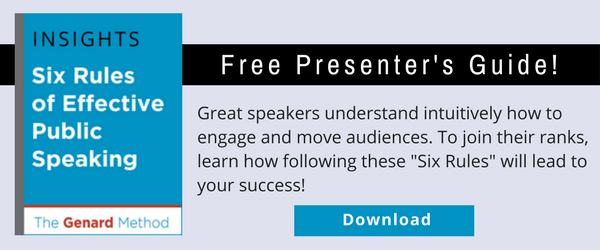
"The secret of being a bore is to tell everything."
-- Voltaire
When speaking to motivate, you need to know who your listeners are and what they expect from you. So ask yourself the following four sets of questions beforehand. The answers will benefit you with any audience, but will be especially helpful with those you want to move toward action:
Who are you trying to influence in this presentation?
- Is it the people actually in the room or auditorium?
- Is it, instead, bosses, board members, or other opinion leaders not present?
- Are there other behind-the-scenes decision-makers to be concerned about?
- Should your primary influence be aimed at representatives of the media?
- Is speaking to the community at large the smarter move at this point?
- Are there political considerations that supersede your actual presentation?
- The central question here, then, is his: Are the people in the room the ones you really need to convince—or is it someone else?
What do these people know and expect in this speaking situation?
- What is the audience’s knowledge of your topic?
- How much essential information should you be trying to get across? (Avoid an “information dump!”)
- Do your listeners have clear expectations concerning your presentation?
- What are their preferences concerning presentation style and the level of engagement and participation?
- Here, you need discipline! You must speak at the appropriate level of knowledge, including only critical information. Do your homework. Can you obtain information about previous presentations to this group? What did those speakers do, and were their efforts successful? Why or why not?
What is the emotional context of the occasion?
- Is there any bias toward or against you, your topic, or your organization?
- Are the attendees here voluntarily or not?
- Is there an emotional context (recent disasters, a crisis, layoffs, etc.) you should know about?
- Do cultural issues apply?
- Are your organization’s values important to this audience?
- How easy or difficult is the action you’re asking of them as a result of your presentation?
Emotions and values can be critical factors in your success as a presenter, and you ignore them at your peril. Does this prospective customer or audience have a worldview that is central to their reception of your message? Has anything occurred in their world recently that will positively or negatively impact their receptivity?
How will your message benefit these listeners?
- What is the relationship of your topic to their professional or personal lives?
- Do you include practical knowledge or skills they can use immediately?
- Does your talk foster group cohesion and motivation?
- Is your good will completely evident to them?
Your listeners must believe that you are speaking for their benefit, not your own. Is that message getting through to your audience loud and clear?



